The success of succulents
Shanghai’s pot-plant fashion sees office workers dumping their suits to go gardening
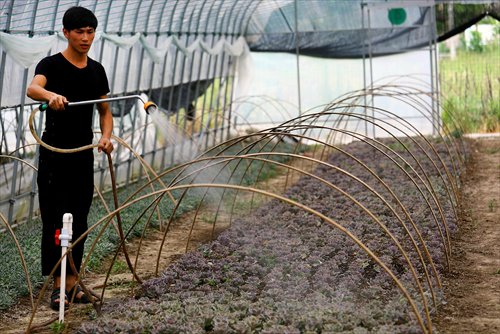
Mo Pingping waters succulents in his nursery in Fengxian district - it usually takes an hour to finish watering a greenhouse. Photo: Yang Hui/GT
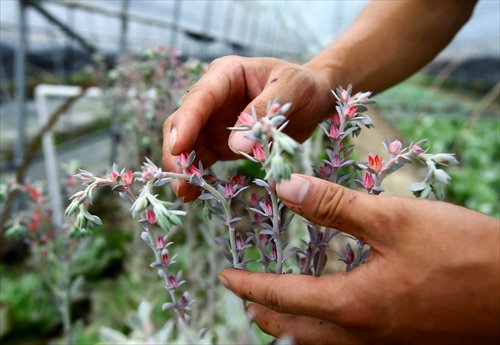
Succulents come in a variety of colors, shapes and sizes. Photo: Yang Hui/GT
Succulent plants were virtually unknown in Shanghai a few years ago. Now they are the thing. Succulents, which are drought resistant and colorful, store water in their leaves, stems and roots. In Shanghai these easy-to-tend plants have become a hot topic with thousands now found in offices and homes throughout the city.
The soaring popularity of the plants can be tracked back to 2013 and the boom has seen some amateur plant enthusiasts shedding their work clothes to become full-time succulent suppliers and gardeners.
Mao Rujia is a succulent specialist with the Shanghai Botanical Garden and she knows of several city dwellers who have resigned from good jobs to grow the plants full time. "Farmers who used to grow succulents used to struggle to make ends meet," she noted.
She told the Global Times that succulents appeared in and around Shanghai more than 10 years ago. "But those small plants were not attractive at all and it wasn't until 2013 that they caught on. I was really surprised at how quickly things changed."
While many succulents are easy to care for, which is often cited as the reason for their newfound popularity, Mao said that as living standards got better city residents looked for other things in life.
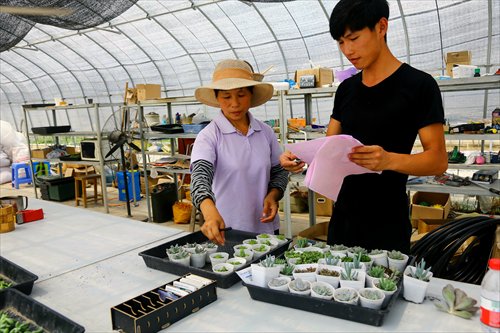
Mo's mother helps him in his business. Photo: Yang Hui/GT
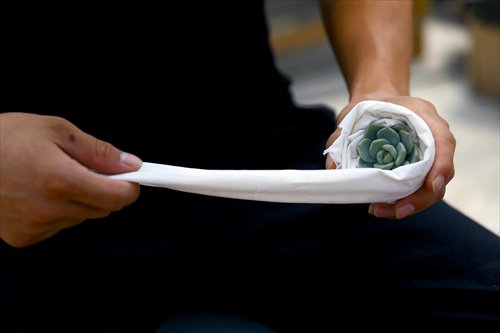
Mo carefully packs a plant in protective wrapping so it reaches the customer undamaged. Photo: Yang Hui/GT
Meeting the demand
"I learned about these plants back in 2000, but there were very few people in the country growing them then," said Xia Xinyu, a one-time banker but now a succulents shop owner in a flower market in Huangpu district.
She saw the popularity of the plants soar in 2013 and she decided to turn her hobby into a business. "These plants appreciate in value, they are colorful, there's a great variety and because they are new in China there is a need to meet the demand," she told the Global Times.
Born in a village in Songjiang district, 33-year-old Wu Peifeng saw the growing popularity of succulents as an opportunity to achieve his entrepreneurial dreams. "Although there's no grand business plan, these small plants really gave me my first steps toward my dream of starting something."
The young man has already grown nearly 10,000 plants to date and he is selling them online. He said business was quite promising.
Unlike Xia, Mo Pingping knew very little about succulents but accidentally got caught up in the boom. From 2011 Mo had been selling cacti from his online store and was also offering a few succulents in his catalogue. "Suddenly, in 2013 the shop saw this burst in demand for succulents. I couldn't keep up with the demand," the 23-year-old admitted.
After he graduated from a vocational school in mid 2011, Mo tried a few different jobs but eventually took his mother's advice and tried doing business online. "People in their 40s or even older prefer larger plants. Younger customers like small plants that can be kept on desks," Mo said. Office workers like the plants because they are hard to kill and require little care.
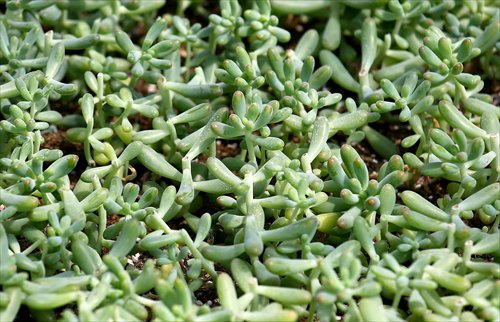
Some of the succulents Mo grows. Photo: Yang Hui/GT
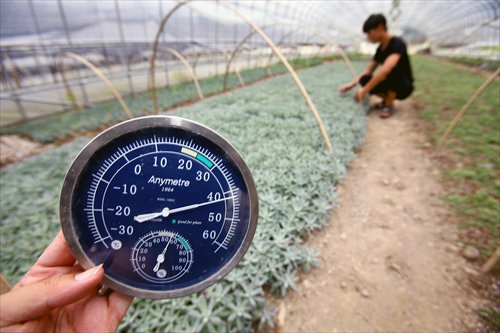
Succulents can thrive in harsh environments even when summer temperatures soar over 40 C. Photo: Yang Hui/GT
After-sales service
Although Xia's shop is not the only one selling succulents she seems to be the only one offering free after-sales services. "I don't mind spending time saving plants if my customers can't manage to look after them. Often if I rescue one that was surely about to die, I really perk up," she said.
Her husband used to work for a multinational company but resigned last year to help his wife in her shop.
Mo has expanded his business considerably. He has given up retail for wholesale trading and he now owns a 26,000-square-meter plant nursery in Jinhui town, Fengxian district where he grows more than 100 varieties of succulents. He expects his turnover this year to be around 4 million yuan ($628,525).
Before he took up the business he had no interest in or knowledge of these plants. He's picked up everything he now knows from visiting other nurseries, listening to experts and reading the shared online experiences of other gardeners.
"There are three important things for growing succulents - proper watering, pest control and the right amount of sunlight," he said. Mo's wholesale rates run at between 1.5 and 20 yuan per plant but his retailers will probably double that price when they sell the plants to their customers.
At Xia's shop the prices range from 20 yuan for a pot plant to several thousand yuan for a rare or exotic succulent. The Welwitschia, a species known as "the living fossil," can cost 7,000 yuan.
In December 2013, a two-centimeter-tall succulent plant was sold at an auction in Shanghai for 85,000 yuan. "People are willing to pay for what they believe it is worth. But the under-100-yuan plants are the best sellers in my shop," she said.
For Xia Xinyu the income from her plant shop is not guaranteed and it's not as much as she was earning at the bank. But she is happy and said that because looking after the plants helped her relax she hopes this will help other people relax.
While Xia and Mao are optimistic about the future of succulents Mo Pingping is more realistic and has looked at the market in South Korea. "Conservatively I think there might be a few more years to go before this market in China will cool and the sales will settle down." For the time being, he said, succulents remain the core of his business but soon he will develop other products like gardening implements, tools and ornaments.